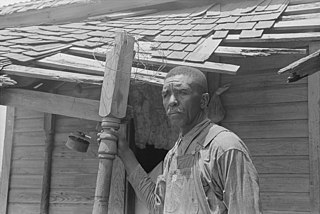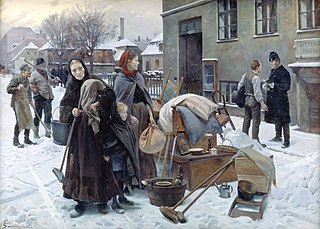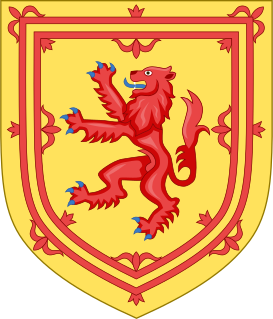Related Research Articles

A tenant farmer is a person who resides on land owned by a landlord. Tenant farming is an agricultural production system in which landowners contribute their land and often a measure of operating capital and management, while tenant farmers contribute their labor along with at times varying amounts of capital and management. Depending on the contract, tenants can make payments to the owner either of a fixed portion of the product, in cash or in a combination. The rights the tenant has over the land, the form, and measures of payment vary across systems. In some systems, the tenant could be evicted at whim ; in others, the landowner and tenant sign a contract for a fixed number of years. In most developed countries today, at least some restrictions are placed on the rights of landlords to evict tenants under normal circumstances.

Sharecropping is a legal arrangement with regard to agricultural land in which a landowner allows a tenant to use the land in return for a share of the crops produced on that land.

Eviction is the removal of a tenant from rental property by the landlord. In some jurisdictions it may also involve the removal of persons from premises that were foreclosed by a mortgagee.

A lease is a contractual arrangement calling for the user to pay the owner for the use of an asset. Property, buildings and vehicles are common assets that are leased. Industrial or business equipment are also leased. Basically a lease agreement is a contract between two parties: the lessor and the lessee. The lessor is the legal owner of the asset, while the lessee obtains the right to use the asset in return for regular rental payments. The lessee also agrees to abide by various conditions regarding their use of the property or equipment. For example, a person leasing a car may agree to the condition that the car will only be used for personal use.
A leasehold estate is an ownership of a temporary right to hold land or property in which a lessee or a tenant holds rights of real property by some form of title from a lessor or landlord. Although a tenant does hold rights to real property, a leasehold estate is typically considered personal property.

In common law systems, land tenure, from the French verb "tenir" means "to hold", is the legal regime in which land owned by an individual is possessed by someone else who is said to "hold" the land, based on an agreement between both individuals. It determines who can use land, for how long and under what conditions. Tenure may be based both on official laws and policies, and on informal local customs. In other words, land tenure implies a system according to which land is held by an individual or the actual tiller of the land but this person does not have legal ownership. It determines the holder's rights and responsibilities in connection with their holding. The sovereign monarch, known in England as The Crown, held land in its own right. All land holders are either its tenants or sub-tenants. Tenure signifies a legal relationship between tenant and lord, arranging the duties and rights of tenant and lord in relationship to the land. Over history, many different forms of land tenure, i.e., ways of holding land, have been established.
The Land Acts were a series of measures to deal with the question of tenancy contracts and peasant proprietorship of land in Ireland in the nineteenth and twentieth centuries. Five such acts were introduced by the government of the United Kingdom between 1870 and 1909. Further acts were introduced by the governments of the Irish Free State after 1922 and more acts were passed for Northern Ireland.

The Land War was a period of agrarian agitation in rural Ireland that began in 1879. It may refer specifically to the first and most intense period of agitation between 1879 and 1882, or include later outbreaks of agitation that periodically reignited until 1923, especially the 1886–1891 Plan of Campaign and the 1906–1909 Ranch War. The agitation was led by the Irish National Land League and its successors, the Irish National League and the United Irish League, and aimed to secure fair rent, free sale, and fixity of tenure for tenant farmers and ultimately peasant proprietorship of the land they worked.

Land reform in Scotland is the ongoing process by which the ownership of land, its distribution and the law which governs it is modified, reformed and modernised by property and regulatory law.
A leasehold valuation tribunal (LVT) was a statutory tribunal in England which determined various types of landlord and tenant dispute involving residential property in the private sector. An LVT consisted of a panel of three; one with a background in property law ; one with a background in property valuation generally a qualified surveyor; and a layman, although some decisions of an LVT were decided by a single member. LVTs were non-departmental public bodies.

The Scottish Land Court is a Scottish court of law based in Edinburgh with subject-matter jurisdiction covering disputes between landlords and tenants relating to agricultural tenancies, and matters related to crofts and crofters. The Scottish Land Court is both a trial court and an appeal court; hearings at first-instance are often heard by a Divisional Court of one of the Agricultural Members advised by the Principal Clerk. Decisions of the Divisional Court can be appealed to the Full Court, which will consist of at least one legally qualified judicial member and the remaining Agricultural Member. Some cases are heard at first-instance by the Full Court, and these cases may be appealed to the Inner House of the Court of Session.
The history of rent control in England and Wales is a part of English land law concerning the development of rent regulation in England and Wales. Controlling the prices that landlords could make their tenants pay formed the main element of rent regulation, and was in place from 1915 until its abolition by the Housing Act 1988.
A property tax known as "rates" has been levied in Hong Kong since 1845. The tax applies to all domestic and commercial properties unless exempted, and is based upon the rental value of the property, re-assessed each year. Formerly part of the revenue went to the Urban Council and, from 1986, the Regional Council, but since 2000 the whole amount goes to the Hong Kong Government.
The Landlord and Tenant Board is an adjudicative tribunal operating in the province of Ontario that provides dispute resolution of landlord and tenant matters under the Residential Tenancies Act, 2006. It is one of the 13 adjudicative tribunals overseen by the Ministry of the Attorney General that make up Tribunals Ontario.

The Land Law (Ireland) Act 1881 was the second Irish land act passed by the Parliament of the United Kingdom in 1881.
The Housing Act 1988 is an Act of Parliament in the United Kingdom. It governs the law between landlords and tenants. The Act introduced the concepts of assured tenancy and assured shorthold tenancy. It also facilitated the transfer of council housing to not-for-profit housing associations, which was then carried out partly through the system of Large Scale Voluntary Transfer.

The Scottish Land Commission was established by the Scottish Government following the passage of the Land Reform (Scotland) Act 2016 by the Scottish Parliament; the Commission also incorporates the work of the Tenant Farming Commissioner. The Lands Commissioners, who constitute the Commission, have functions relating to land in Scotland, so that they address issues which relate to ownership of land, land rights, management of land, and use of land. The Tenant Farming Commissioner has the aim of improving the relationship between tenant farmers and land owners, and can create codes of practice, provide practical guidance, and must consult on such matters. The Tenant Farming Commissioner cannot be an agricultural landlord or agricultural tenant, and will develop codes of practice which are in addition to the law and the jurisdiction of the Scottish Land Court.
Tribunals Ontario is the umbrella organization for 13 adjudicative tribunals under the Ministry of the Attorney General of Ontario. It was formed on January 1, 2019, from the merger of the Social Justice Tribunals Ontario; Environment and Land Tribunals Ontario; and Safety, Licensing Appeals and Standards Tribunals Ontario tribunal "clusters".

Squatting in Uganda is the occupation of derelict buildings or unused land without the permission of the owner. The complicated history of land tenure has generated conflicts between squatters and owners.

Sir Timothy Miles Fancourt, KC, styled Mr Justice Fancourt, is a judge of the English High Court.
References
- ↑ Ordinary courts - France
- ↑ "FRANCE - LAW & PRACTICE". Archived from the original on 2016-10-26. Retrieved 2016-02-10.